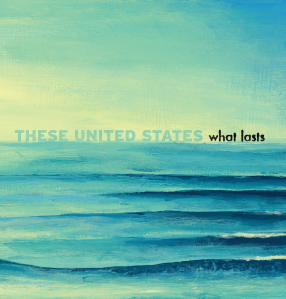The following article is about a recent Eugene, Oregon appearance of The Emmit-Nershi Band, Great American Taxi, and Danny Barnes. All fine musicians with deep bluegrass influences.
But before I get to that article I want to share a related personal story of – something that happened over thirty years ago – the weekend I lost my virginity to bluegrass music. I’ll admit I was nervous, after all… I’d seen Deliverance.
Drums on the Side
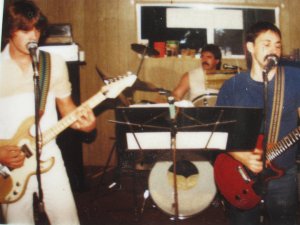
Who Cares! - (L to R - Wayne, me, Felix)
Back in the early 80’s I was the drummer in a three-piece (sometimes four-piece, sometimes five-piece band – depending on who brought beer and a guitar) called Who Cares based out of Mountain Pass, California, Sorry, no hyperlink to that band – we were way ahead of our time and the internet. My band-mates Felix Lenox and Wayne Elliott – both excellent guitarists – were talking one night about the Bluegrass in the Spring Festival, an annual event held in Calico Ghost Town, California. Wayne and his dad, Don, would be performing there as The Mountain Pass Drifters. Felix and I decided that we should pack up the van and head out to Calico and take in the Festival.
The next morning we started loading all the essentials – beer, peanut butter, beef jerky, sleeping bags, and beer. Felix put a couple of his guitars into their cases, grabbed his amp, took them out to the van, snatched a beer out of the cooler and sat in the open back-end of the van.
“Hey, Blake,” he yelled into the house, “you about ready to hit the road?”
“Almost, man,” I said as I came out the side door of our single-wide mobile home carrying my bass drum. “I’ve just got a few more things to load.” I hadn’t noticed Felix’s puzzled look as I set the 20″ drum into the van. I headed back inside, returning shortly after with my toms and cymbal bag.
Felix sat there, his beer bottle – not quite up to his open mouth – seemed blocked by the question that hung on his lips… “What the fuck are you doing?”
Now I had the look of bewilderment. “What the hell does it look like?” I said. “You’re taking your axe; I’m taking mine.”
“I really don’t think you should,” he explained, “Bluegrass people don’t like drummers.”
I smiled, “Shit, everybody loves a drummer.”
It was about a three beer drive (one and a half hours) to Calico Ghost Town from Mountain Pass, California. We staked out a spot in the campground, grabbed a couple more beers from the cooler, headed out to join the crowd and enjoy the music. There were a ton of guitarists, along with more mandolin and banjo players than I had ever seen in one place. As far as I knew, I was the only drummer around.
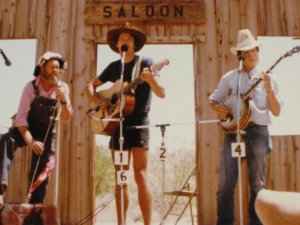
Mountain Pass Drifters (Wayne is front and center)
Felix and I watched the Mountain Pass Drifters compete with some other very good bluegrass bands. Honestly, I couldn’t tell you if they won or not; the day was long and hot, many beers were consumed. After Wayne finished with the serious music, he joined us on the streets of Calico as we performed some bluegrass standards for tips and beer. I armed myself with my snare, hi-hats, brushes, and a pair of sticks (in case I felt the need to get loud). We entered a talent contest at a theatre – that looked like it came right from the set of Gunsmoke – and we won FIRST PLACE! Maybe I read too much into it, BUT, we were the only group with percussion. Don’t tell me these people don’t like drummers.
The nightlife in the Calico Ghost Town campground was a real treat. Everywhere we turned – musicians jammed. Felix and Wayne joined in when it struck them. After making the rounds, we made our way back to the van. As Felix and Wayne picked their way through some tunes, I opened the back doors of the van, pulled my drums out – piece by piece – and quietly assembled them. What’s the worst that could happen? I was surrounded by fellow musicians… drunken bluegrass musicians that – I was told – didn’t like drummers . In my twenties, I didn’t always think things through.
For the most part, it went pretty well. We jammed and people listened. We played bluegrass, country, and rock (we may have even slipped in an acoustic version of B-52’s “Planet Claire”). After a couple of hours of jamming, we took a break. A tall kid in blue jeans and a cropped-sleeved t-shirt approached me at the back of the van. He looked to be about 15 or 16. He asked me if that was my kit and asked if it was okay if he sat down at them. I said, “Sure, go ahead,” figuring he came from a drum-deprived bluegrass family and had never actually seen a drum kit up close – I was wrong.
He tapped around on the skins, then turned around and asked, “You have a tuning key on you?”
I was a bit skeptical at first, but thought I could always re-tune them later. I dug the key out of my pocket and handed the key to him. I watched and listened as he tuned and tapped, tapped and tuned, until my drums sounded sweeter than ever.
He handed me back the key and said, “You mind if I play them a bit?”
“Hell no,” I said, “Thanks for the tuning. Knock yourself out, kid.”
His solo started out slow and unassuming and – as a crowd gathered around our little piece of the ghost town night – gradually built into a complex, melodic, piece of percussive expertise that would have made Neil Peart himself say, “Damn, That kid’s good!” He ended with an explosive crescendo of metal and taut skin that shook the air. The crowd cheered loudly as the young drummer handed me back my sticks and simply said, “Thanks, man.”
I talked to him just long enough to learn that he was 16 and had been playing since he was 8. I thanked him and then he disappeared into the campfire-lit night. Felix and I stood there silently for a bit until Felix said, “You want to play some more?”
“What?” I said, “I ain’t following that.”
“Yeah… me neither,” Felix said.
I thought – Don’t tell me bluegrass people don’t like drummers.
A Hoe-Down Feast
Drew Emmitt (Leftover Salmon) and Bill Nershi (String Cheese Incident) – both founders of popular jam bands – have done the sold-out-stadium, prestigious rock ‘n’ roll thing flawlessly. Over the years they developed a strong friendship as the paths of their bands crossed at shows and festivals. From that kindred-spirit bond grew the idea of forming a project together and returning to their roots as The Emmitt-Nershi Band. They didn’t waste much time focusing on the band’s name; instead, they focused on the music – some of the finest examples of modern bluegrass music you’ll ever hear. Their latest collaboration, New Country Blues, is like a cornucopia filled with the succulent fruits of their love of the music.
Bring Emmitt and Nershi together with their old friends of Great American Taxi – one of the best-known headliners on the jam band circuit – and you’ve got one hell of a show. Former Leftover Salmon singer, guitarist, and mandolin player Vince Herman is one of the founding members of Great American Taxi. The band’s music – a recipe of swampy blues, progressive bluegrass, funky New Orleans strut, honky-tonk country, and good old fashioned rock ’n’ roll – has been self-labeled “Americana Without Borders.” Their latest release, Reckless Habits, captures the raucous enthusiasm of which their live shows are legend.
If that’s not enough, genre-bending banjo man Danny Barnes will join them on stage. While incorporating digital technology and multiple effects pedals, Barnes takes the banjo where it has never been musically. His skill as an instrumentalist has ushered him to share the stage and record with countless multi-genre artists including Leftover Salmon.
This article was originally published in Eugene Weekly, November 4, 2010
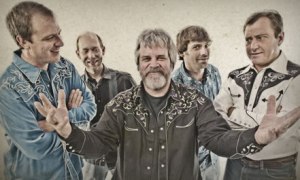
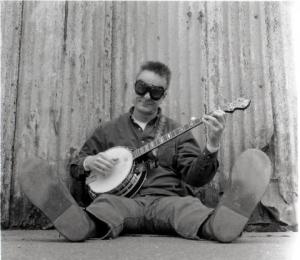
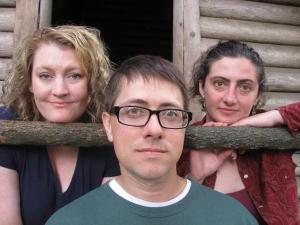
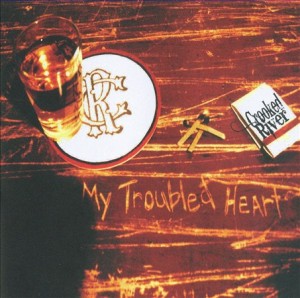
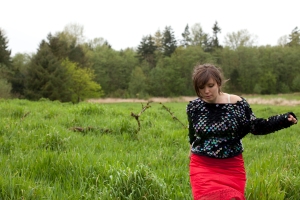
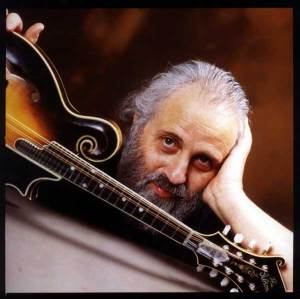
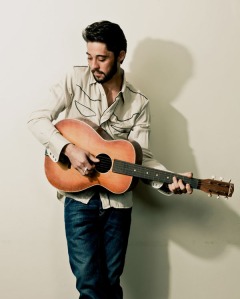
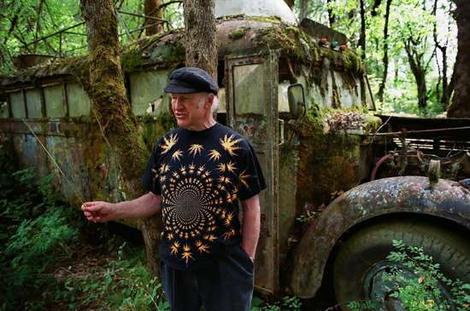
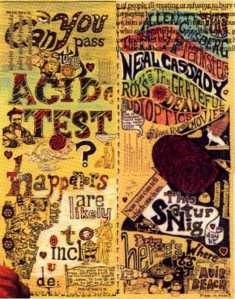
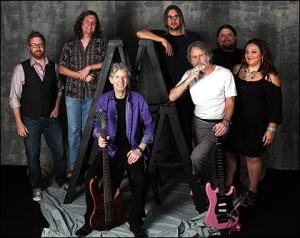
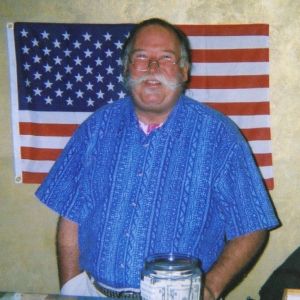
 Since the mid 80s
Since the mid 80s  It wouldn’t be fair to attempt to categorize the
It wouldn’t be fair to attempt to categorize the  The Colorado quartet’s current release, the cleverly packaged
The Colorado quartet’s current release, the cleverly packaged  The D.C.-based band
The D.C.-based band 